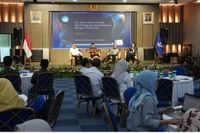Indonesia is taking significant steps to strengthen the sovereignty of its national language through the Uji Kemahiran Berbahasa Indonesia (UKBI), a language proficiency test that has gained remarkable traction since its inception. The UKBI is designed to measure both the oral and written proficiency of individuals in Bahasa Indonesia, making it a vital tool for the nation's educational and professional frameworks.
As of March 26, 2025, the UKBI Adaptif, which is the online version of the test, has seen participation from over 1 million individuals, including 534 foreign nationals from 68 different countries. This impressive number highlights the growing recognition of Bahasa Indonesia as an essential language for academic and professional pursuits.
The UKBI Adaptif is accessible through the website ukbi.kemendikdasmen.go.id, allowing participants from various geographical locations to take the test without facing logistical barriers. This online format has made it easier for many, as noted by Hafidz Muksin, the Head of the Badan Pengembangan dan Pembinaan Bahasa (Badan Bahasa), during an event in Jakarta on March 24, 2025. "We are proud to see UKBI becoming an important benchmark for assessing Indonesian language proficiency, both in educational institutions and other organizations," he stated.
UKBI serves multiple purposes. It is a requirement for the Beasiswa Unggulan, a national scholarship program, and is also utilized in the Sekolah Menengah Kejuruan Pusat Keunggulan (SMK PK) program aimed at enhancing literacy. Additionally, more than 60 universities in Indonesia have adopted UKBI as a graduation requirement for their students, further solidifying its role in the academic landscape.
Participants can register for the UKBI through the same online platform, and the test is offered at five different times throughout the day: 08:00 WIB, 10:00 WIB, 13:00 WIB, 16:00 WIB, and 19:00 WIB. This flexibility caters to a diverse group of test-takers, including the general public, students, and professionals in various fields.
The provinces of Indonesia are also getting involved, with UKBI being implemented in 38 provinces and 500 regencies and cities. Jawa Timur stands out with the highest number of participants, totaling 151,249, while Kabupaten Sidoarjo and Kota Jakarta Selatan have 19,649 and 25,898 participants, respectively.
Moreover, the UKBI is not just for locals; it has attracted interest from foreign learners of Bahasa Indonesia. Noha Gharib Ahmed, a BIPA (Bahasa Indonesia bagi Penutur Asing) student from Egypt, expressed that the UKBI is crucial for foreign students wanting to study in Indonesia. "UKBI is very important for foreign students coming to Indonesia; it proves that they can speak Indonesian and study here. It's not enough to just have a TOEFL score; they will also become ambassadors of Indonesia in their own countries," she remarked.
Similarly, Maram Alarnab from Syria encouraged her fellow foreign speakers to participate in the UKBI, stating, "I recommend my friends from my country to take the UKBI; the UKBI certificate can also be used to find jobs." This sentiment underscores the increasing value of Bahasa Indonesia in the global job market.
The UKBI consists of five sections: listening, responding to rules, reading, writing, and speaking. The scoring system categorizes results into several levels: Istimewa (Exceptional) for scores between 725 and 800, Sangat Unggul (Very Excellent) for scores between 641 and 724, Unggul (Excellent) for scores between 578 and 640, Madya (Moderate) for scores between 482 and 577, Semenjana (Satisfactory) for scores between 405 and 481, Marginal for scores between 326 and 404, and Terbatas (Limited) for scores between 251 and 325.
As the UKBI continues to grow in popularity and importance, it serves as a crucial instrument for maintaining the sovereignty of Bahasa Indonesia. Hafidz Muksin emphasized the need for increasing participation, particularly in educational institutions, stating, "UKBI is one of our efforts to preserve the sovereignty of the Indonesian language. We hope the number of UKBI participants continues to rise, especially in educational settings."
In conclusion, the UKBI is not just a test; it is a reflection of Indonesia's commitment to promoting its national language on both domestic and international stages. With its increasing adoption and recognition, the UKBI is paving the way for a future where Bahasa Indonesia holds a prominent place in the global academic and professional arenas.






